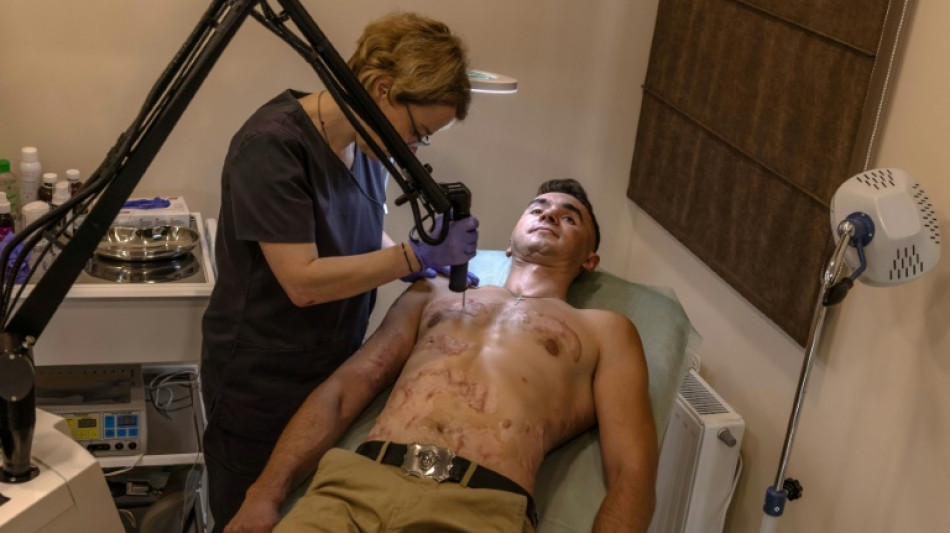
-
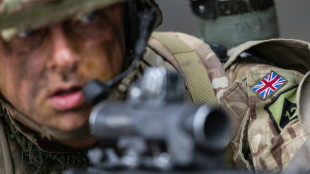 UK launches paid military gap-year scheme amid recruitment struggles
UK launches paid military gap-year scheme amid recruitment struggles
-
Jota's children join tributes as Liverpool, Wolves pay respects

-
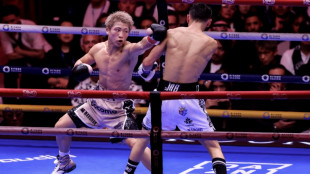 'Tired' Inoue beats Picasso by unanimous decision to end gruelling year
'Tired' Inoue beats Picasso by unanimous decision to end gruelling year
-
Thailand and Cambodia declare truce after weeks of clashes
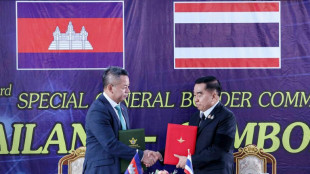
-
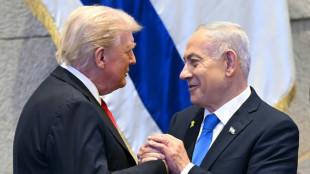 Netanyahu to meet Trump in US on Monday
Netanyahu to meet Trump in US on Monday
-
US strikes targeted IS militants, Lakurawa jihadists, Nigeria says

-
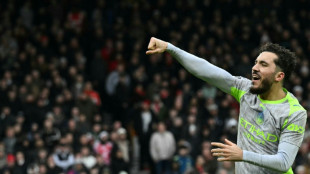 Cherki stars in Man City win at Forest
Cherki stars in Man City win at Forest
-
Schwarz records maiden super-G success, Odermatt fourth

-
 Russia pummels Kyiv ahead of Zelensky's US visit
Russia pummels Kyiv ahead of Zelensky's US visit
-
Smith laments lack of runs after first Ashes home Test loss for 15 years

-
 Russian barrage on Kyiv kills one, leaves hundreds of thousands without power
Russian barrage on Kyiv kills one, leaves hundreds of thousands without power
-
Stokes, Smith agree two-day Tests not a good look after MCG carnage

-
 Stokes hails under-fire England's courage in 'really special' Test win
Stokes hails under-fire England's courage in 'really special' Test win
-
What they said as England win 4th Ashes Test - reaction

-
 Hong Kongers bid farewell to 'king of umbrellas'
Hong Kongers bid farewell to 'king of umbrellas'
-
England snap 15-year losing streak to win chaotic 4th Ashes Test

-
 Thailand and Cambodia agree to 'immediate' ceasefire
Thailand and Cambodia agree to 'immediate' ceasefire
-
Closing 10-0 run lifts Bulls over 76ers while Pistons fall

-
 England 77-2 at tea, need 98 more to win chaotic 4th Ashes Test
England 77-2 at tea, need 98 more to win chaotic 4th Ashes Test
-
Somalia, African nations denounce Israeli recognition of Somaliland

-
 England need 175 to win chaotic 4th Ashes Test
England need 175 to win chaotic 4th Ashes Test
-
Cricket Australia boss says short Tests 'bad for business' after MCG carnage

-
 Russia lashes out at Zelensky ahead of new Trump talks on Ukraine plan
Russia lashes out at Zelensky ahead of new Trump talks on Ukraine plan
-
Six Australia wickets fall as England fight back in 4th Ashes Test

-
 Man Utd made to 'suffer' for Newcastle win, says Amorim
Man Utd made to 'suffer' for Newcastle win, says Amorim
-
Morocco made to wait for Cup of Nations knockout place after Egypt advance

-
 Key NFL week has playoff spots, byes and seeds at stake
Key NFL week has playoff spots, byes and seeds at stake
-
Morocco forced to wait for AFCON knockout place after Mali draw

-
 Dorgu delivers winner for depleted Man Utd against Newcastle
Dorgu delivers winner for depleted Man Utd against Newcastle
-
US stocks edge lower from records as precious metals surge

-
 Somalia denounces Israeli recognition of Somaliland
Somalia denounces Israeli recognition of Somaliland
-
The Cure guitarist and keyboard player Perry Bamonte dies aged 65

-
 Draper to miss Australian Open
Draper to miss Australian Open
-
Police arrest suspect after man stabs 3 women in Paris metro

-
 Former Montpellier coach Gasset dies at 72
Former Montpellier coach Gasset dies at 72
-
Trump's Christmas gospel: bombs, blessings and blame

-
 Russia lashes out at Zelensky ahead of new Trump meeting on Ukraine plan
Russia lashes out at Zelensky ahead of new Trump meeting on Ukraine plan
-
Salah helps Egypt beat South Africa and book last-16 place

-
 Australia's Ikitau facing lengthy lay-off after shoulder injury
Australia's Ikitau facing lengthy lay-off after shoulder injury
-
Another 1,100 refugees cross into Mauritania from Mali: UN

-
 Guardiola proud of Man City players' response to weighty issues
Guardiola proud of Man City players' response to weighty issues
-
Deadly blast hits mosque in Alawite area of Syria's Homs

-
 The Jukebox Man on song as Redknapp records 'dream' King George win
The Jukebox Man on song as Redknapp records 'dream' King George win
-
Liverpool boss Slot says Ekitike reaping rewards for greater physicality

-
 Judge jails ex-Malaysian PM Najib for 15 more years after new graft conviction
Judge jails ex-Malaysian PM Najib for 15 more years after new graft conviction
-
Musona rescues Zimbabwe in AFCON draw with Angola

-
 Zelensky to meet Trump in Florida on Sunday
Zelensky to meet Trump in Florida on Sunday
-
'Personality' the key for Celtic boss Nancy when it comes to new signings

-
 Arteta eager to avoid repeat of Rice red card against Brighton
Arteta eager to avoid repeat of Rice red card against Brighton
-
Nigeria signals more strikes likely in 'joint' US operations


Scar tissue: Treating war's marks on Ukrainians
A laser beam moved slowly over Sergiy Pryshchepa's chest and stomach, treating numerous scars from burns he suffered when his car ran over an anti-tank mine close to Kyiv.
The 34-year-old comes regularly to this private clinic in the Ukrainian capital for a programme offering free treatment for civilians and military personnel with severe burns and scarring received in the war.
Soon after Russia invaded Ukraine in February 2022, Pryshchepa left Kyiv with his wife and 10-year-old son and went to a village 100 kilometers (60 miles) to the north.
But the area came under attack and on March 14, the family decided to flee again. On the way, their car was blown up by an anti-tank mine.
"The explosion was on my wife's side, and she took the blow on herself. Our son was in the back, he was covered by the seat and was not wounded," but he "suffers from psychological trauma", said the commercial director of a company that makes lifts.
"The first thing I asked at the hospital was 'How did I not lose my head?'," he said, showing a picture of his car, which was completely charred and torn apart.
Sixteen months later, he had skin grafts from his legs and several operations on his jaw and one hand.
Now he attends the Shupeniuk clinic in Kyiv, which is one of 19 across the country offering the free treatment.
"Before giving laser treatment, we use certain medications that soften the rough scar tissue... First injections, then laser resurfacing, and thanks to this (scars) become less thick, lighter, less rough", said Kateryna Bezvershenko, the dermatologist treating Pryshchepa.
"Half of our patients are civilians, and not only from the Kyiv region... There is a man who has just been hit by a drone in his apartment. His mother died. He survived but he is badly burned," she added.
- 'Hands were burning' -
The dermatologist was also treating 35-year-old Feliks Rasko, a volunteer who joined the military at the start of the conflict.
His hands were seriously burnt in October in the eastern war zone, when the building where he slept was struck by Russians.
He said he realised his hands were "burning".
"I woke up from a strong blow and everything around was burning, the walls were on fire," he recounted.
He has also had operations and skin grafts from a leg.
After the latest laser session on his scars, streams of blood run down his fingers.
"If you compare this to the treatments I had at the beginning... it's now like a mosquito bite," he said. His hands, however, "constantly itch".
- 'Lucky to be treated' -
"I have been very lucky, starting from the moment when those missiles flew at us and lucky that I am treated like this. Not everyone is treated like this," he said.
"Even for the ointments they give me, I don't pay anything. Everything is free and it really helps me," he added, expressing gratitude as a single laser treatment session usually costs hundreds of dollars.
The project was conceived at the start of the Russian invasion and launched last summer.
It is financed by private donations in partnership with the Ukrainian health ministry and has treated around 150 people.
Bezvershenko has already treated around a dozen war victims since joining the project, saying she is helping them "with great joy".
"It's very important to me because I am a medical doctor and I do not take part in military operations. I have felt a great need to help our military and people who have been affected by the war," she said.
"I don't get anything out of this except inner satisfaction and the joy of being able to help people because I see such stories."
L.Davis--AMWN



